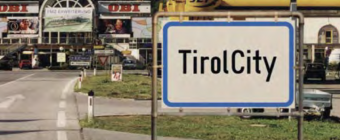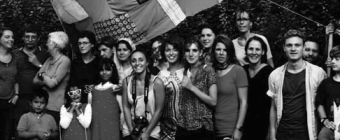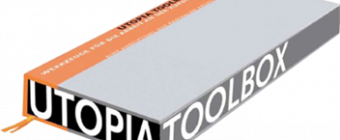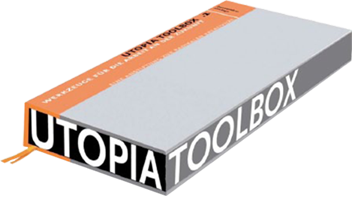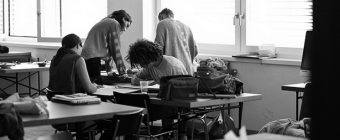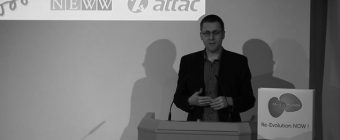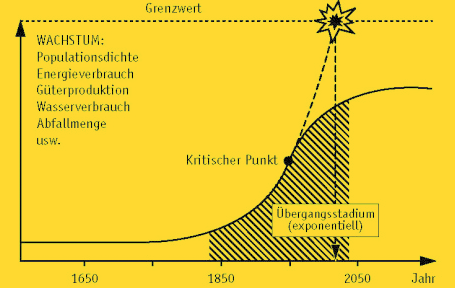Author Archives: Kris Krois
19.3. Brixen: Das Zeitalter der Knappheit und Ansätze der Bewältigung von unten
19. März 2014 | 16.00 – 18.00 | Raum 2.60 | Campus Brixen
Prof. Dr. Isidor Wallimann, Basel und Syracuse
DAS ZEITALTER DER KNAPPHEIT ist als Metapher für die Zukunft gedacht, auf die wir heute mit unseren nicht nachhaltigen Verhaltensweisen hinsteuern. Um dramatische Engpässe und Konflikte in der Zukunft zu verhindern, muss heute „vorgesorgt“ und die sozial-ökologische Transformation eingeleitet werden. Vorgestellt wird theoretisch und praktisch der Ansatz der Sozialen und Solidarischen Ökonomie für eine nachhaltige Entwicklung in Industrie- und Entwicklungsländern. Als Praxisbeispiel dafür dient die Soziale Ökonomie Basel.
Im Rahmen von “Wachstumswende und ökosoziales Wirtschaften – Zukunft partizipativ gestalten” des Studium Generale der unibz. Offen für alle Interessierten.
Hörner/Antlfinger: Discrete Farms | 18.3. 19:00
18.3.2014 19:00 | unibz Ser F0.03 | BY DESIGN OR BY DISASTER TALKS
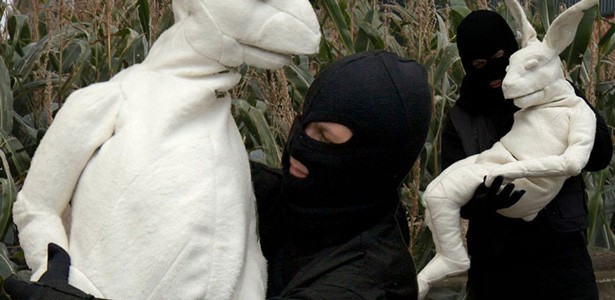
As part of the dialogue between human and non-human existences in the “art system” and the “everything-else system,” since the 1990s Hörner/Antlfinger offer critical perspectives on the technologization of our world. More about Hörner/Antlfinger and their guest lecture.
Anders sehen: Der Alpenraum am beispiel Tirol
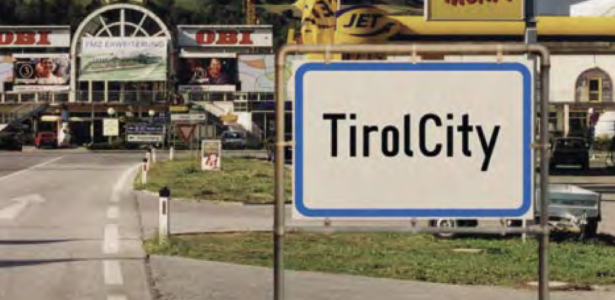
Frische Blicke eröffnen neue Möglichkeiten. Mehr davon im Vortrag
ALPINE URBANE LANDSCHAFTEN. DAS BEISPIEL NORDTIROL
URBAN LANDSCAPE AND LANDSCAPE URBANISM IN THE REGION OF NORTHTYROL
von WOLFGANG ANDEXLINGER
11.3.2014 19:00 | unibz Ser F0.01 | BY DESIGN OR BY DISASTER TALKS
mehr zu Vortrag auf unserer Seite und im Facebook Event.
Ökosozialer Wandel in Diskurs & Praxis
Im Studium Generale starten Prof. Susanne Elsen (Soziologie) & Prof. Kris Krois (Visuelle Kommunikation und Interaktionsdesign) gerade das Modul “Wachstumswende und ökosoziales Wirtschaften – Zukunft partizipativ gestalten” — eine lebhafte Mischung aus hochkarätigem Diskurs und praktischer Gestaltungsarbeit. Diskutiert werden Themen des ökosozialen Wandels, u.a. im Rahmen von Gastvorlesungen von Prof. Dr. Adelheid Biesecker (Wirtschaftswissenschaftlerin), Prof. Dr. Cordula Kropp (Umweltsoziologin) und Prof. Dr. Isidor Wallimann (Soziologie, Volkswirtschaftlehre und Sozialpolitik). In Workshops gestalten konkrete Projekten, mit einem Werkzeugkasten für Aktivisten, voll gepackt mit Methoden der Partizipation, mit Medienstrategien und Gestaltungsmitteln der Visuellen Kommunikation. In den Workshops wirken mit: Katherina Longariva (blufink / Partizipation), Ines Visintainer (Web & Soziale Medien) und Manueler Dasser (Visuelle Kommunikation). Das volle Programm.
Stellt es euch vor und tut es. Die Gestaltung der Zukunft
Alles wird über Internet gekauft …
… So füllen sich unsere Straßen mit Paketbotenautos, entlang der Autobahnen entstehen riesige Warenverteilzentren, und zweifellos wird es im Inneren der Städte in absehbarer Zeit kein einziges Geschäft mehr geben, wozu denn? Aber da sind ja dann nutzlose Räume, leere Läden, was machen wir damit?
Im Anschluss skizziert Axel Hacke in seiner Kolumne im SZ Magazin “Das Beste aus aller Welt” im Heft 05/2014 eine fantastische Vision: die Innenstädte werden belebt durch Künstler zu Freiräumen der Muse, der Poesie, des Flanierens, … denn für den Konsum werden sie jetzt nicht mehr gebraucht. Das inspirierende an seinem wie immer charmant geschriebenen Artikel ist diese plastische Darstellung einer Vision, dieses “es könnte ganz anders sein und zwar so”, und folglich auch, “was wir haben ist nicht Gottgegeben” (z.B. die konsum-optimierten Innenstädte, Einkaufstraßen, Fußgängerzonen). Was Hacke hier vollzieht ist eine lockere Vorlage, für Schreibende, Designer, Künstler und eigentlich für Alle. Wir dürfen so frei sein unsere Träume einer anderen Welt zu skizzieren . Das ist ja schon mal ein erster Schritt. Leben müssen wir in der gegenwärtigen Welt, aber vorstellen dürfen wir uns alles (hierzu: Zizek im unabsichtlich witzigen Vortrag bei Occupy). Und in vielen Situationen können wir die Visionen auch ausprobieren. Die Gemeinschaftsgärten fallen mir dazu ein. Hier werden alternative Weisen des Zusammenlebens und -arbeitens erprobt – ausgezeichnet reflektiert im Buch Urban Gardaning. Eine Vielfalt an anderen Beispielen, wo Menschen spielerisch ernsthafte Alternativen gestalten sind im wunderbaren Band Die Stadt der Commonisten zusammengestellt (Vortrag von Christa Müller). Motto: nicht das Lamento und die theoretische Analyse verändern die Welt zu besseren, sondern die kreative und kollektive Praxis.
Überall poppen Alternativen auf, die konkrete Utopien entwerfen oder gar leben. Die letzte ist mir in einem Vortrag des Designers Ruedi Baur begegnet, der die öffentlichen Beschriftungen der Kleinstadt Nègrepelisse nicht wie für Designer üblich selbst entworfen hat, sondern den Bürgern geholfen hat diese selbst zu machen. Erstanden ist nicht nur ein anderes Stadtbild, sondern auch eine anderes Leben – ein gemeinsames Schaffen, Sprechen, Zusammentreffen und gestalten (mehr zu: “Imaginer Nègrepelisse !“). Designer gestalten nicht mehr die Welt von Konsumenten, sondern helfen Bürgern ihre Welt selbst zu gestalten. Von Design-Diktator zum Gestaltungs-Fazilitator.
Aktuell: GEMEINWOHLWIRTSCHAFT in Südtirol
Die Idee und Praxis der Gemeinwohlökonomie breitet sich in Südtirol zunehmend aus (die vielen Artikel und Initiativen zum Thema, die sich alleine auf salto.bz hierzu finden bestätigen das). Auf zwei Veranstaltungen im November sei hingewiesen – auf beiden mischen Prof. Dr. Susanne Elsen und andere Akteure der Uni Bozen mit.
Gemeinwohlökonomie in Südtirol
23.11. 2013, 09.30 – 12.30 Uhr, Bozner Messe ( Latemar Saal)
mehr dazu (PDF)
Gemeinwohlregion Vinschgau
28.11.2013 14.00 – 18.00 Uhr, Schloss Goldrain (Schlossstraße 33 I-39021 Goldrain)
mehr dazu (PDF)
Wer nicht weiss, was mit Gemeinwohlökonomie gemeint ist, findet auf der Web-Site der Bewegung gute Erklärungen. Hier ein Vorgeschmack:
Die gegenwärtigen ökologischen, sozialen und ökonomischen Krisen fordern mutige und entschlossene Visionen und Menschen, die sich an der Entwicklung einer nachhaltigen Zukunft beteiligen. Die Bewegung für eine Gemeinwohl-Ökonomie versteht sich in diesem Sinne als Impulsgeber und Initiator für weitreichende Veränderungen.
Post-Desaster
Looking back on our event, I am very happy that the experiment worked:
we started with the idea that design today has effects everywhere and that sustainable lifestyles and systems require changes everywhere, too. Logical consequence: design should be used for the eco-social transitions we need so urgently. Therefor, designers got to get into the multi-facetted matters and concerns of such transformations and other actors working towards sustainable changes need an understanding of design and get together with designers for using this powerful instrument effectively.
To foster understanding, collaboration and co-design with our event we brought together divers persons, groups, practices and discourses – hoping that they work together in fruitful ways. And they did :) The setting we prepared, the tools and process we offered proofed to be useful. And above all, the persons and groups we invited were great!
 We got plenty of very positive feedback, like “… using a very real local issue added so much tangible value to the experience as a opportunity for learning.” wrote Joe Shaw. The workshops showed that designers can get people work together to design and develop solutions. Within such creative processes not only products and services are designed, but the shared experience of successfully designing and producing together, is an outcome by its own. On top of this some relations created in such processes keep on working together, for example between the both initiatives L’Orto Semi Rurali and AKRAT in case of the workshop with Cecilia Palmer. The role of the designer as a facilitator works.
We got plenty of very positive feedback, like “… using a very real local issue added so much tangible value to the experience as a opportunity for learning.” wrote Joe Shaw. The workshops showed that designers can get people work together to design and develop solutions. Within such creative processes not only products and services are designed, but the shared experience of successfully designing and producing together, is an outcome by its own. On top of this some relations created in such processes keep on working together, for example between the both initiatives L’Orto Semi Rurali and AKRAT in case of the workshop with Cecilia Palmer. The role of the designer as a facilitator works.
Some more praise: “I really appreciated the critical and alternative approach of the invited speakers.” (Andreas Trenker). And I was happy that the divers discourses completed to each other, in some cases it appeared as if they would have been prepared together as the two talks of Susanne Elsen and of Open State.
With her discourse on Eco-Social Transformation Susanne laid the ground for the practical approaches and examples Open State presented directly after her talk.
There are be many other things to mention and to show. We will soon publish a documentation, with all talks as videos and some more documents, among other the real-time-booklets that where produced by during the event by Nina & Elletra (Words & Ideas), Tobia (Photography), Philip & Amin (Design and much more, always with great efficiency and beauty). Thank you! And thanks to all the many volunteers!
 Proceedings will be published somewhen next year. In the meanwhile we start preparing the next edition of BY DESIGN OR BY DISASTER, which might get going already in winter 2013. We will change setting and focus, because winter is not summer, and we will also consider the critical feedback, like the remark of Brave New Alps, who wished to have more time after the conferences to deepen issues in a discussion. Therefor we will foresee a more time for dialog after the talks next time. Ursula Tischner, who is currently organizing the sustainability maker convention (October 15, Cologne), wished there would have been a real party with dancing. I can only agree, saying with Emma Goldman: “If I can’t dance, it’s not my revolution!”. More critical feedbacks and ideas are very welcome!
Proceedings will be published somewhen next year. In the meanwhile we start preparing the next edition of BY DESIGN OR BY DISASTER, which might get going already in winter 2013. We will change setting and focus, because winter is not summer, and we will also consider the critical feedback, like the remark of Brave New Alps, who wished to have more time after the conferences to deepen issues in a discussion. Therefor we will foresee a more time for dialog after the talks next time. Ursula Tischner, who is currently organizing the sustainability maker convention (October 15, Cologne), wished there would have been a real party with dancing. I can only agree, saying with Emma Goldman: “If I can’t dance, it’s not my revolution!”. More critical feedbacks and ideas are very welcome!
One thing did not work out at all: the incredibly committed and excellent cook Armin did get only very few donations for PREM PRASAD, the initiative providing food in the street of india. But fortunately you can also donate online. If you liked the food and the service, please give something!
Last but not least: I am happy to continue the collaboration with Alvise Mattozzi. Our both characteristics and competencies complete each other. And next time we get in a third person, which is more straight forward than both of us, too ;-)
See more images on FB.
UTOPIA TOOLBOX
provides and creates tools for a consciuos designing of our future which will be particularly challenging, and demanding creative processes beyond familiar dimensions.
It is about desiging the space between people: the political, social, artistic, scientific, economic,
philosophical, spiritual, practical space.
It is an artproject by people of various professional fields who like to work together in projects, grow in scale, scope and capacity through collaborative interdisciplinary work. Their common basis is an open
definition of creativity which does not exclude any field of work. These collectives share, at their core, an
idea and a belief that creativity is our single most valuable resource. The only resource providing
solutions for the dramatic global chaos we face.
Art is critique on a mechanistic way of thinking.
found on utopiatoolbox.org
They just published a UTOPIA TOOLBOX book [mainly in German language]. You can take a look over there.
In Köln ist auch was los (ausser Karneval)
Vom 28. September bis 6. Oktober läuft in Köln das Ökorausch-Festival, das ebenfalls Design und Nachhaltigkeit verbindet.
Ökorausch klingt in meinen Ohren nicht eben berauschend, aber in der Ausstellung sind interessante Projekte zu entdecken, z.b. das fairphone.
Auf dem Symposium spricht u.a. Christa Liedtke vom Wuppertal Institut, aber keine Designer …
… dafür gibt es ein über die Stadt verteiltes Programm für Groß und Klein ;-)
Registration Open
Register until 8th of September for the conference to benefit from free food, drinks and WLAN (you can also buy tickets later, but you won’t get the free extras then).
Each workshop accepts a maximum of 16 participant. Please apply until 8 of September.
Participants from Bolzano hosting guests from elsewhere, can register for free – please inform Hannelore Schwabl about your offer and register until 8th of September. If you need free accommodation, please write an request to Hannelore.
Find more information on our FAQ page.
Postwachstumsökonomie im Schnelldurchlauf
Niemand fasst die Grundzuge einer nachhaltigen Form des Lebens und des Wirtschaftens knackiger und kompetenter zusammen als Prof. Niko Paech, ein Wirtschaftswissenschaftler und damit wie er sagt “ein Mann für’s Grobe”.
Mehr dazu in einem Artikel auf zeit.de, im lesenswerten Lesetipp im konsumpf.de und in einer kurzen Zusammenfassung zum Thema auf postwachstumsoekonomie.org, wo ich auch das Diagramm von Frederich Vester wieder gefunden habe, das anschaulich macht wieso es bei unbegrenztem Wachstum irgendwann “Peng” macht. Vester hatte versucht systemisches Denken für einen nachhaltigen Wandel nutzbar zu machen. In meiner Jugend in den 80ern hatte mich sein Buch “Neuland des Denkens – Vom technokratischen zum kybernetischen Zeitalter“ sehr inspiriert. Er hatte die Gabe komplexes nicht nur zu verstehen, sondern auch zu vermitteln.
Transformative Design / Design Transformations
Design has an impact on the way we consume and produce, we work and live, how we collaborate and how we make decisions, … we want to use design for transformations towards sustainability. This involves ecological, social and economic aspects. Designers have to consider all those dimensions and collaborate with experts of different backgrounds. While non-designers should know about the potential and the “logic” of design.
In our conference and workshops we – Alvise Mattozzi and me – bring together various competences in order to learn from each other and to experiment practices of transformative design.
On this blog we will collect related material. We are happy about comments, proposals and critic. The rest of this web site is under development. More information on the program will be added continuously. Get the newsletter to stay up-to-date.
Registration for the conference day and for the 2-day workshops starts on july 22nd.
We thank Amin Al Hazwani and Philip Santa for the excellent design and the development of this web site.

